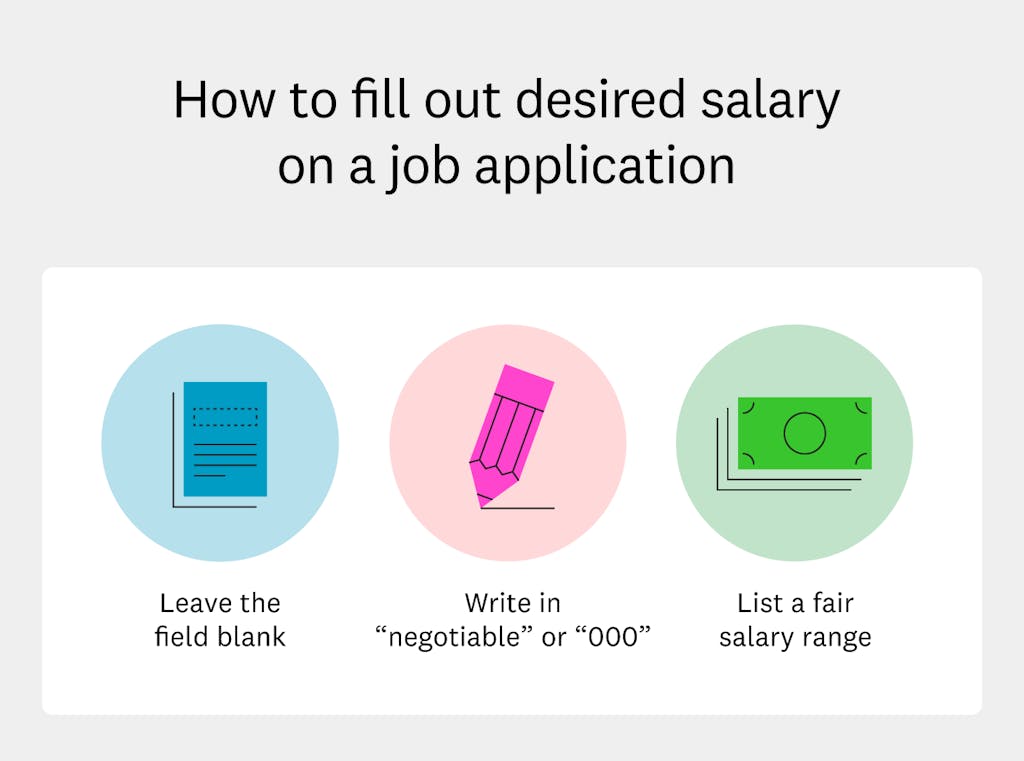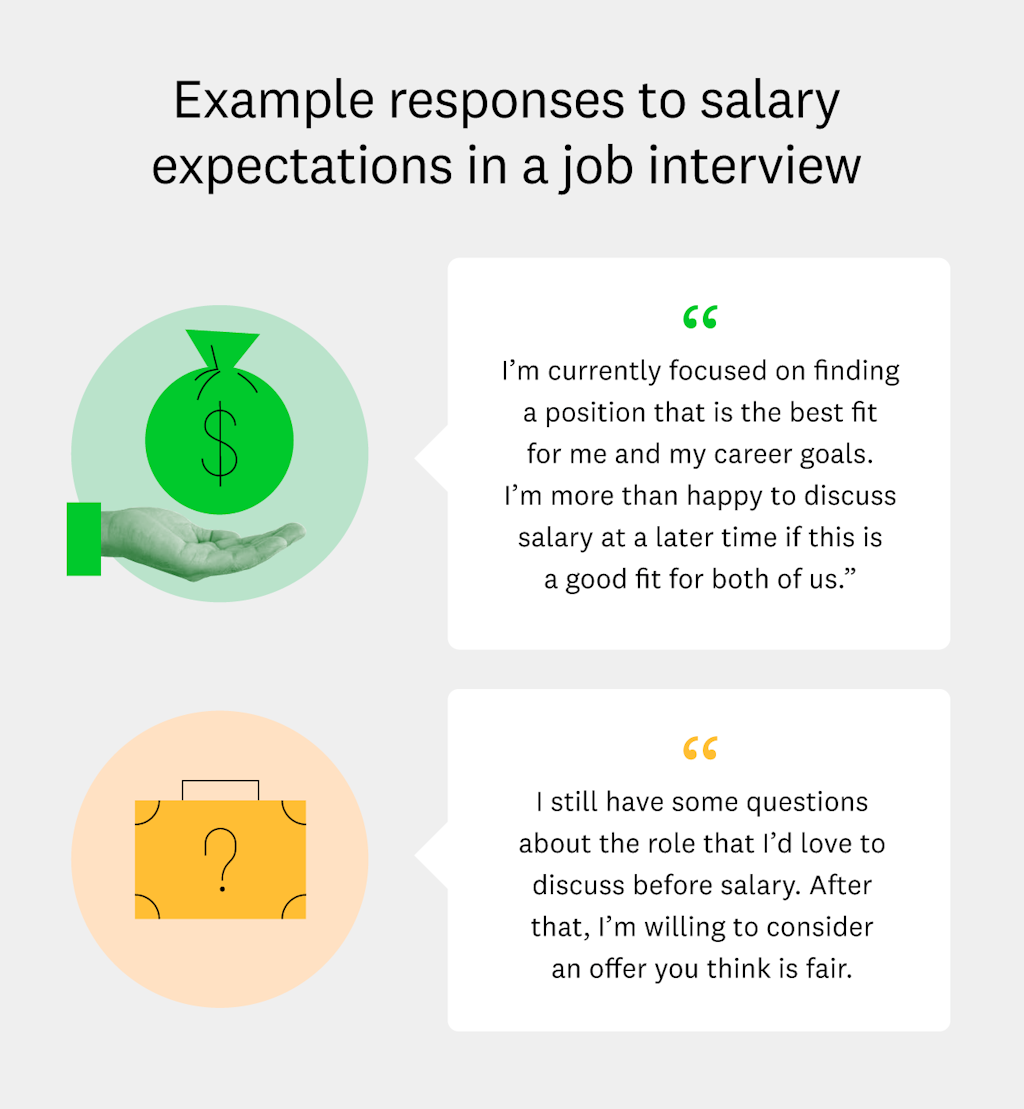In a Nutshell
When answering desired salary or expected salary questions on an application, the best approach is to write in “negotiable” or keep the field blank. If a numerical response is required, enter “000” and in a notes section, mention that salary is negotiable based on further understanding of the position.Many job applications ask for your desired or expected salary. Companies may ask for salary requirements to help screen potential job candidates in both the application and interview processes.
Still, your answer may constrain your earning potential or even cost you the job. We’ll review tips to help you tackle this thorny question on your job applications.
- How to answer desired salary on an online application
- How to answer the desired salary question in interviews
- When to discuss salary
How to answer desired salary on an online application
Many job applications ask for your desired salary, but it’s not necessarily in your best interest to answer the question.
One strategic approach is to delay the salary discussion as long as possible. Familiarize yourself with these three answer options so that you’re ready to tackle this question in your next job application.
 Image: how-to-fill-out-desired-salary-on-a-job-application
Image: how-to-fill-out-desired-salary-on-a-job-applicationOption 1: Leave it blank
Your first option for delaying the salary discussion is to leave it blank. The reasoning is that any number you specify could limit your salary options or eliminate you from the running in case your answer was out of budget.
Check out how both scenarios could play out below.
If your specified salary is too high …
The hiring team may decide not to pursue your application. After discussing how your skills and experience can bring value to the team, you may have more leverage to negotiate a higher salary. Don’t hinder your chances of getting an interview by listing a salary that may be out of the company’s budget.
If your specified salary is too low …
It may be harder for you to negotiate your compensation package later in the hiring process. For example, suppose you originally specified $50,000 in your application but learned through market research during the interview process that $60,000 is a fair salary for the position.
In that case, it may be difficult to justify a counteroffer.
Option 2: Write in “negotiable”
Another option for avoiding the salary discussion early in the hiring process is to let them know that you’d like to negotiate the salary based on a full understanding of the position. You can communicate this in an application by simply writing “negotiable” into the field designated for the desired salary.
Not every application will allow a nonnumerical answer to this question. If that is the case and you can’t submit “negotiable” as your answer, try writing in a number as a placeholder, like “000” or “999.” This entry should satisfy the number requirement without limiting your salary later.
Option 3: Identify a suitable range
Some applications may require an answer in the form of a range, or they may not accept “000” or “999.” If so, your last option is to identify a desired range. It’s important to research salaries for your position and location and to list a range based on current market value.
Start by looking up the median salary for the position, and don’t forget to compare it against competitive salaries in your area to determine a reasonable range.
How to answer the desired salary question in interviews
Remember that it’s usually better to negotiate your salary after showing your value and receiving an offer for the job. Use these tips for delaying the discussion during interviews to secure a salary that matches your worth.

Option 1: Postpone the conversation
Regarding the salary question during an interview, you may first want to try postponing the conversation — preferably until after you have a job offer. Prepare a few lines to navigate away from this discussion during an interview. Try out one of the examples below:
- “I’m currently focused on finding a position that best fits me and my career goals. I’m happy to discuss salary later if it’s a good fit for us both.”
- “I don’t have a number in mind at this time, but I’d love to keep discussing the role so that we both better understand what would be fair compensation based on my skills and experience.”
Option 2: Ask questions
Another way to stall the salary discussion is by asking questions about the budget for the role. You can also inquire about job responsibilities that will inform how you determine your desired salary. Some examples of what to ask are listed below:
- “I still have questions about the role that I’d love to discuss before salary. After that, I will consider an offer you think is fair.”
- “I don’t have a specific number in mind, but I’m interested in how your company values the role. Are you able to discuss the budget for the position?”
When to discuss salary
It’s usually best to discuss salary only after you’ve received a job offer. Attempting to negotiate before then may leave you at a disadvantage, especially if other candidates are still involved. If you haven’t been formally offered the position, but think you’re close, ask to confirm where you are in the hiring process with this line:
- “I prefer to discuss salary after I’ve received a job offer. Is this the case?”
- “Can you tell me more about when you expect to make a decision for this role?
 Image: best-time-to-discuss-salary
Image: best-time-to-discuss-salaryOnce you have a confirmed offer, negotiate a salary matching your skills, location and experience level. Before entering these discussions, brush up on negotiation tactics and tips to help you be more persuasive when discussing salary.


